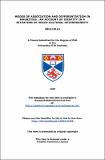Files in this item
Modes of association and differentiation in Mauritius : an account of identity in a situation of socio-cultural heterogeneity
Item metadata
| dc.contributor.advisor | Rapport, Nigel | |
| dc.contributor.author | Hills, Mils | |
| dc.coverage.spatial | 266 | en_US |
| dc.date.accessioned | 2015-04-09T12:49:06Z | |
| dc.date.available | 2015-04-09T12:49:06Z | |
| dc.date.issued | 1999 | |
| dc.identifier | uk.bl.ethos.544007 | |
| dc.identifier.uri | https://hdl.handle.net/10023/6455 | |
| dc.description.abstract | This Thesis details the anthropological investigation of socio-cultural heterogeneity in Mauritius, a small island republic in the Indian Ocean. I introduce the island, its population, climate and other salient features in the Introduction, where I also reveal something of the author's intentions, interests and ideology. Although Mauritius has been relatively infrequently written about by anthropologists or other social scientists, when Mauritian social diversity has been discussed it has been conducted on the presumption that difference is synonymous with division. Consequently, in Chapter 1, I develop a critique of this assumption, which has found its way into the texts and discourses of both sociologists and state bureaucrats. I collapse these two categories' products into one, by drawing upon Foucault's notion of 'governmentality', and critique widespread views of Multiculturalism as being founded on the alleged coevalness of difference and division. I also introduce my three main analytical tools: intersubjectivity, transcendence and creolization. Chapter 2 portrays individuals' identity, agreeing that at times those Mauritians that I met did draw divisions between one another, but that this was far from predictable, nor universally practised. Chapter 3 continues this project, by focusing on specific forms of the expression of division, but again I highlight the unanticipated nature of division and difference. Chapter 4 further clouds the picture by noting that even where individuals might be thought to be unproblematically employing ethnic - or caste - based strategies in, for example, the workplace, the use of such tools was again unforseeable, and not always successful. Even where they were successful in securing advantage, there are wider costs not previously noted in the ethnographic record. Chapter 5 is the culmination of my argument. Through a fine-grained portrayal of a number of ethnographic moments, I point up the unifying and shared practices which have hitherto been excerpted from ethnographic accounts of Mauritius (or other 'plural' societies). These unifying features are as relevant to my understanding of Mauritian society as divisions, I claim, and I reflect on the contrast between 'banal' unities and governmental notions of Multiculturalism. The Conclusion draws together the threads of the Thesis and charts where it fits in terms of wider anthropological and political trends. | en_US |
| dc.language.iso | en | en_US |
| dc.publisher | University of St Andrews | |
| dc.rights | Creative Commons Attribution-NonCommercial-NoDerivatives 4.0 International | |
| dc.rights.uri | http://creativecommons.org/licenses/by-nc-nd/4.0/ | |
| dc.subject.lcc | DT469.M4H5 | |
| dc.title | Modes of association and differentiation in Mauritius : an account of identity in a situation of socio-cultural heterogeneity | en_US |
| dc.type | Thesis | en_US |
| dc.type.qualificationlevel | Doctoral | en_US |
| dc.type.qualificationname | PhD Doctor of Philosophy | en_US |
| dc.publisher.institution | The University of St Andrews | en_US |
This item appears in the following Collection(s)
Except where otherwise noted within the work, this item's licence for re-use is described as Creative Commons Attribution-NonCommercial-NoDerivatives 4.0 International
Items in the St Andrews Research Repository are protected by copyright, with all rights reserved, unless otherwise indicated.


